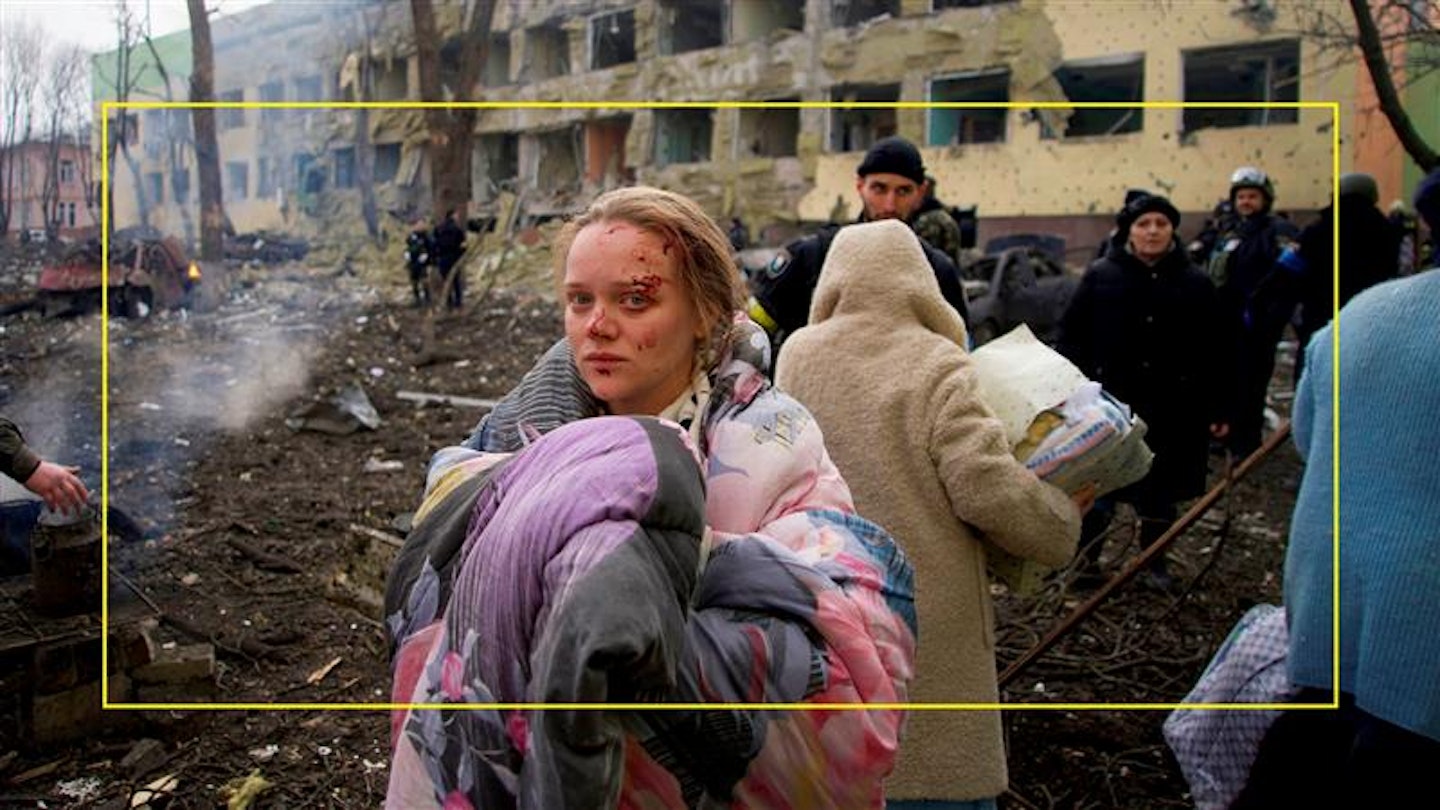The images shocked the world: just when you thought sights coming from Ukraine couldn’t be any more devastating, the Russian Air Force bombed a maternity and children’s hospital in Mariupol.
Photo journalists captured pregnant women fleeing for their lives and mothers with newborns in their arms. One woman was pictured being carried from the bomb site on a makeshift stretcher, heavily pregnant and covered in rubble. Her surgeon, Tumir Marin, later confirmed that both she and her unborn baby died, despite relentless attempts to save them.
Mariana Vishegirskaya, 19, a beauty blogger who documented her pregnancy on Instagram, was also photographed fleeing the scene on foot, covered in blood (pictured above), in stark contrast to the beautiful images on her timeline.
Their stories are harrowing, and they are just two of countless women who have been forced to give birth under the threat of war in Ukraine. The surrogacy crisis has also made the news. One makeshift bomb shelter in Kyiv is reported to be housing 21 babies all born via surrogate, being looked after by nurses until their parents can rescue them from the war zone.
Official estimates calculate that more than 80,000 refugees fleeing Ukraine are doing so while pregnant or having recently given birth.
Nataliia Proshchyn, 37, an orthodontist living with her husband in Kyiv, was one of them. The day the war began, she sent her 12-year-old son to stay with family friends in Croatia, as she had a Caesarean scheduled at a hospital in the city the following afternoon. But at 6.30am the next morning she was woken by the sound of combat. The Ukrainian army’s air defence had shot down a Russian rocket right outside her window. She knew she had to deliver her baby as soon as possible.
‘I contacted my doctor asking [him] to perform the C-section immediately,’ she tells Grazia. ‘I had to drive myself to pick up the doctor. Where he lives there were sirens going off all the time, so we had to keep stopping. When we finally arrived at Kyiv City Maternity Hospital, sirens started there too and everyone had to evacuate from the highest floors of the building.’
I had to be conscious for my c-section in case we needed to evacuate.
Nataliia was taken to an underground shelter in the hospital where she was told that, since operation rooms were all on the higher floors, the doctor would need to perform her C-section there. ‘They brought all they could to do the surgery underground – a table and medical equipment – but because of the situation they couldn’t put me under full anaesthesia. I had to be conscious in case we needed to evacuate further, so the doctor could only give me local anaesthetic.’
Due to the lack of supplies, the doctor was also unable to cover Natalia’s body while they operated. ‘The anaesthesiologist stood next to my head and told me not to look down, they did their best to talk to me and keep me calm.’
When Nataliia’s baby girl was born, she was handed to her husband who was waiting outside the room with bags packed ready to escape at any moment. Doctors worked to stop the heavy bleeding resulting from Nataliia’s surgery and, once she was stitched up, she was told she had four hours to recover and ‘get ready to run’ in case of further alarms. ‘In the end, I was able to stay at the hospital for three days because there was a curfew,’ she remembers. ‘But after that I knew I had to leave, there were so many people who needed assistance and not enough space for us all. We went home, but there were explosions in our neighbourhood so we had to stay in an underground parking lot. I was there for two days before my husband insisted that I flee.’
He had to stay behind as Ukraine has ordered men between 18 and 60 to remain to fight. ‘It was so painful leaving him behind, my parents too, but I drove myself, my newborn and our dog to the border.’
.jpeg?auto=format&w=1440&q=80)
It took Nataliia two days to get to the border because of all the checkpoints and a further nine hours to cross it before she arrived in Hungary. Fortunately, she had friends who were able to arrange the relevant documents for her baby to escape the country. Others haven’t been so lucky.
‘We are seeing women and children arriving at the border in freezing conditions with just one backpack and one jacket,’ Plan International’s global humanitarian director Dr Unni Krishnan tells Grazia. ‘They tell us that some new mothers with babies just days old are stuck for several hours at the border because the newborns don’t have birth certificates, passports or any of the paperwork needed to pass through.’
For Nataliia, with her baby daughter and now reunited with her son in Croatia, the next hurdle is reuniting the whole family. ‘I’m alone with my two children and I feel so lonely. My oldest child seems fine but my three-week-old daughter has colic and cries all day and night. I feel like I’m in shock, all I think about is how I can help people and when I will be able to return home.’
To support those affected by the war, text GRAZIA to 70141 to give £10 or donate online at redcross.org.uk/grazia
Read More:
These Are The Donation Collection Points For Ukraine Near You
'When Putin Invaded My Country I Wanted To Show The World That Ukraine Was Ready To Unite'
